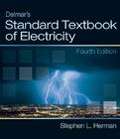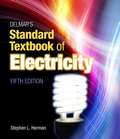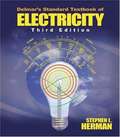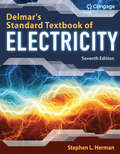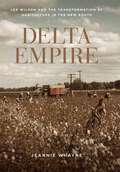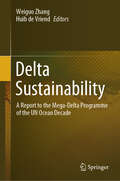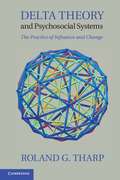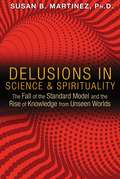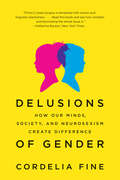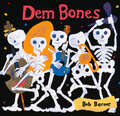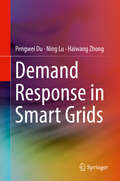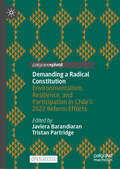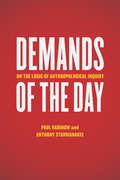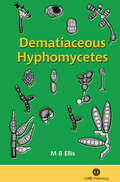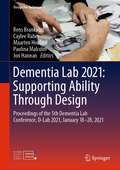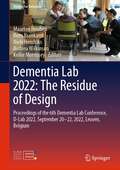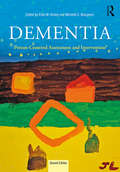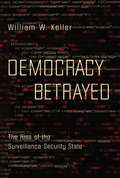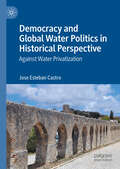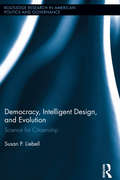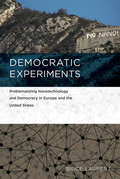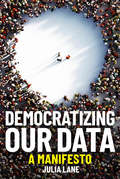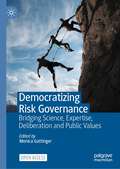- Table View
- List View
Delmar's Standard Textbook of Electricity
by Stephen L. HermanUnderstanding the theory and application of electrical concepts is necessary for a successful career in the electrical field specifically in industrial maintenance and installation, and this newly revised, full color text delivers! Delmar's Standard Textbook of Electricity, Fourth Edition trains aspiring electricians by blending concepts relating to electrical theory with practical 'how to' information that prepares readers for situations commonly encountered on the job. This revision retains all the hallmarks of our market-leading prior editions, but displays enhancements such as more practical application problems. Topics span the major aspects of the electrical field including direct and alternating current circuits, basic theory, transformers, generators, and motors. This new edition has been organized so that all relevant information is located within a given chapter which allows for flexibility to access and cover topics in any order making this text an indispensable resource.
Delmar's Standard Textbook of Electricity
by Stephen L. HermanMastering the theory and application of electrical concepts is necessary for a successful career in the electrical installation or industrial maintenance fields, and this new fifth edition of DELMAR'S STANDARD TEXTBOOK OF ELECTRICITY delivers! Designed to teach by blending concepts relating to electrical theory and principles with practical 'how to' information that prepares you for situations commonly encountered on the job. Topics span all the major aspects of the electrical field including atomic structure and basic electricity, direct and alternating current, basic circuit theory, three-phase circuits, single phase, transformers, generators, and motors. This revision retains all the hallmarks of our market-leading prior editions and includes enhancements such as updates to the 2011 NECr, a new chapter on industry orientation, and new coverage of constant-current transformers and fuel cells as well as reference tips on going green throughout the text.
Delmar's Standard Textbook of Electricity (3rd Edition)
by Stephen L. HermanMastering the theory and application of electrical concepts is necessary for a successful career in the electrical installation or industrial maintenance fields, and this newly revised, full color text delivers! Delmar's Standard Textbook of Electricity, 3E trains aspiring electricians by blending concepts relating to electrical theory with practical 'how to' information that prepares students for situations commonly encountered on the job. Topics span the major aspects of the electrical field including atomic structure and basic electricity, direct and alternating current, basic circuit theory, three-phase circuits, single phase, transformers, generators, and motors. This revision retains all the hallmarks of our market-leading second edition, but displays enhancements such as new up-to-date photos, bonus learning features to advance student retention, and a new e. resource for instructors that takes the guesswork out of classroom preparation.
Delmar’s Standard Textbook of Electricity
by Stephen L. HermanCombine comprehensive coverage of basic electrical theory with practical "how to" information to prepare students for real practice with DELMAR'S STANDARD TEXTBOOK OF ELECTRICITY, 7E by Stephen Herman. This edition covers all aspects of basic theory with no assumption of prior electrical knowledge. The author also limits math to basic algebra and trigonometry with step-by-step examples. Quality schematics and illustrations guide students through basic electrical circuits; DC and AC theory; and equipment such as meters, transformers and motors. Numerous examples demonstrate how to complete common tasks electricians perform, while succinct units cover only one or two topics each to ensure clarity. In addition, new coverage of spike and surge protection and motor installation complies with the 2017 NEC. MindTap online resources are also available with interactive multimedia and options to customize and track and report progress.
Delta Empire: Lee Wilson and the Transformation of Agriculture in the New South (Making the Modern South)
by Jeannie WhayneIn Delta Empire: Lee Wilson and the Transformation of Agriculture in the New South Jeannie Whayne employs the fascinating history of a powerful plantation owner in the Arkansas delta to recount the evolution of southern agriculture from the late nineteenth century through World War II. After his father's death in 1870, Robert E. "Lee" Wilson inherited 400 acres of land in Mississippi County, Arkansas. Over his lifetime, he transformed that inheritance into a 50,000-acre lumber operation and cotton plantation. Early on, Wilson saw an opportunity in the swampy local terrain, which sold for as little as fifty cents an acre, to satisfy an expanding national market for Arkansas forest reserves. He also led the fundamental transformation of the landscape, involving the drainage of tens of thousands of acres of land, in order to create the vast agricultural empire he envisioned. A consummate manager, Wilson employed the tenancy and sharecropping system to his advantage while earning a reputation for fair treatment of laborers, a reputation -- Whayne suggests -- not entirely deserved. He cultivated a cadre of relatives and employees from whom he expected absolute devotion. Leveraging every asset during his life and often deeply in debt, Wilson saved his company from bankruptcy several times, leaving it to the next generation to successfully steer the business through the challenges of the 1930s and World War II. Delta Empire traces the transition from the labor-intensive sharecropping and tenancy system to the capital-intensive neo-plantations of the post--World War II era to the portfolio plantation model. Through Wilson's story Whayne provides a compelling case study of strategic innovation and the changing economy of the South in the late nineteenth century.
Delta Sustainability: A Report to the Mega-Delta Programme of the UN Ocean Decade
by Huib De Vriend Weiguo ZhangThis book examines sustainability issues of 15 deltas in the world. Each delta is described in five sections: physical setting, socioeconomic characteristics, current issues, management measures and perspective for future pathways to greater sustainability. These deltas, diverse in their geographical and economic conditions, are all confronted with natural hazards and pollution issues, posing threats to ecological health, human security and economic development. The book offers an overview of delta challenges in an integrated natural and social science approach. It is intended for researchers, graduate students and the public, especially those dwelling in deltas. It aims to improve knowledge of the current situation and to enhance awareness of the urgency of collective action to prepare for the uncertain future of these deltas. Possible future pathways towards delta sustainability are also addressed in the book.
Delta Theory and Psychosocial Systems: The Practice of Influence and Change
by Roland G. TharpDelta Theory establishes the foundation for a true scientific applied psychology, a theory of how human influence induces change in others. Delta Theory is unified and universal, applying to all cultures, historical periods and goals for change. It integrates concepts and research from psychology, sociology, anthropology, evolution theory, philosophy, psychoneurology, cognitive science and cultural-historical-activity theory. Yet Delta Theory is clear, economical and elegant, with a full exposition of tactics for its practices. Rich examples are drawn from professional practices, but also from the creation and operations of criminals, healing ceremonies of indigenous peoples, and cross-species comparisons. This book ultimately seeks to describe how influence works, how it could be improved and how it can be resisted.
Delusions in Science and Spirituality: The Fall of the Standard Model and the Rise of Knowledge from Unseen Worlds
by Susan B. MartinezDebunks cherished theories of mainstream consensus and reveals the deeper mysteries of the science of the unseen • Reveals a new “Theory of Everything” to replace the standard model and complete our knowledge of Earth Science, anthropology, psychology, and spirituality • Explains the failings of the Big Bang, evolution, ice age theory, and global warming • Shows how the Freudian and Jungian theories of the unconscious have grossly misrepresented the spirit of man and the psyche of humanity What if science and society’s most darling theories, taught as fact, were 100% wrong? What if the anomalies that disprove these theories were covered up and distorted and any serious challenges brushed off as lunacy, hysteria, junk science, and dissension? In this primer in deprogramming, Susan B. Martinez reveals the disinformation at the root of mainstream consensus thinking. She punches gaping holes in the cherished theories of the Big Bang, Darwinian evolution, ice ages, and global warming. Drawing on the ancient science of the unseen and revelations from the Oahspe Bible as well as some of the most advanced thinkers in astrophysics, she explains a new “Theory of Everything” to replace the standard model. She explores the concept of vortexya, the cosmic whirlwind of our own geomagnetic field, which explains quite simply the subtle changes that take place on Earth and in the universe over time without the “magical thinking” of the Big Bang, global warming, or ice ages. Martinez reveals how the instability of society itself has found its way into our theories, positing explosive change and acceleration where there is none. She explains how homo sapiens’ evolution did not suddenly accelerate 40,000 years ago and culture did not accelerate to birth civilization a mere 6,000 years ago. She shows how the theories of the Freudian and Jungian unconscious and of reincarnation have grossly misrepresented the spirit of man and the psyche of humanity. Resurrecting the majestic order that was once recognized at the basis of reality, Martinez shows that the shift from the Age of Disinformation to the Age of Understanding is well underway.
Delusions of Gender: How Our Minds, Society, and Neurosexism Create Difference
by Cordelia Fine"[Fine's] sharp tongue is tempered with humor. . . . Read this book and see how complex and fascinating the whole issue is."--The New York Times <P><P> It's the twenty-first century, and although we tried to rear unisex children--boys who play with dolls and girls who like trucks--we failed. Even though the glass ceiling is cracked, most women stay comfortably beneath it. And everywhere we hear about vitally important "hardwired" differences between male and female brains. The neuroscience that we read about in magazines, newspaper articles, books, and sometimes even scientific journals increasingly tells a tale of two brains, and the result is more often than not a validation of the status quo. Women, it seems, are just too intuitive for math; men too focused for housework. <P><P> Drawing on the latest research in neuroscience and psychology, Cordelia Fine debunks the myth of hardwired differences between men's and women's brains, unraveling the evidence behind such claims as men's brains aren't wired for empathy and women's brains aren't made to fix cars. She then goes one step further, offering a very different explanation of the dissimilarities between men's and women's behavior. Instead of a "male brain" and a "female brain," Fine gives us a glimpse of plastic, mutable minds that are continuously influenced by cultural assumptions about gender. <P><P> Passionately argued and unfailingly astute, Delusions of Gender provides us with a much-needed corrective to the belief that men's and women's brains are intrinsically different--a belief that, as Fine shows with insight and humor, all too often works to the detriment of ourselves and our society.
Dem Bones
by Bob Barner&“No bones about it, this will be a real boost for those looking to inject a little humor and fun into basic facts about the human body.&” —Publishers Weekly (starred review) Shoulder bone connected to da neck boneNeck bone connected to da head bone . . . Colorful torn paper collages bring to life this familiar African American spiritual as frolicking, instrument-playing skeletons—accompanied by interesting, informative &“bone facts&”—entertain and educate young readers. At Halloween or all year round, at home or in the classroom, Dem Bones is a &“clever anatomy lesson . . . geared for tickling the funny bones of the early elementary set&” (Publishers Weekly). &“A snappy introduction to the human skeleton . . . The artwork makes this an inviting picture book to read aloud in primary-grade classrooms.&” —Booklist &“A book that entertains and educates this age group and gets them tapping their toe bones, too. Bravo.&” —Family Life
Demand Response in Smart Grids
by Ning Lu Pengwei Du Haiwang ZhongThis book is the first of its kind to comprehensively describe the principles of demand response. This allows consumers to play a significant role in the operation of the electric grid by reducing or shifting their electricity usage in response to the grid reliability need, time-based rates or other forms of financial incentives. The main contents of the book include modeling of demand response resources, incentive design, scheduling and dispatch algorithms, and impacts on grid operation and planning. Through case studies and illustrative examples, the authors highlight and compare the advantages, disadvantages and benefits that demand response can have on grid operations and electricity market efficiency.First book of its kind to introduce the principles of demand response;Combines theory with real-world applications useful for both professionals and academic researchers;Covers demand response in the context of power system applications.
Demanding Energy: Space, Time and Change
by Gordon Walker Allison Hui Rosie DayThis edited collection critically engages with an important but rarely-asked question: what is energy for? This starting point foregrounds the diverse social processes implicated in the making of energy demand and how these change over time to shape the past patterns, present dynamics and future trajectories of energy use. Through a series of innovative case studies, the book explores how energy demand is embedded in shared practices and activities within society, such as going to music festivals, cooking food, travelling for business or leisure and working in hospitals. Demanding Energy investigates the dynamics of energy demand in organisations and everyday life, and demonstrates how an understanding of spatiality and temporality is crucial for grasping the relationship between energy demand and everyday practices. This collection will be of interest to researchers and students in the fields of energy, climate change, transport, sustainability and sociologies and geographies of consumption and environment. Chapters 1 and 15 of this book are available open access under a CC BY 4.0 license at link.springer.com
Demanding a Radical Constitution: Environmentalism, Resilience, and Participation in Chile’s 2022 Reform Efforts
by Javiera Barandiaran Tristan PartridgeThis open access book documents the critical thinking and political actions that generated one of the world’s most progressive national constitutions, presented to the Chilean public in 2022. Although that text was ultimately rejected in a national referendum, it drew on decades of diverse environmental, political, Indigenous, and community organizing and contained concepts and goals at the forefront of global efforts to create more just and equitable political systems, healthier living environments, and more resilient ecosystems. Drawing on research by faculty and students from the USA and Chile, chapters within this book address political memory, Indigenous representation, public participation, the Rights of Nature, environmental law, mining conflicts, natural commons, knowledge systems, and rural education. This book highlights important contributions from Chile’s 2022 reform efforts for diverse global responses to the erosion of democracy, environmental degradation, and climate change.
Demands of the Day: On the Logic of Anthropological Inquiry
by Paul Rabinow Anthony StavrianakisDemands of the Day asks about the logical standards and forms that should guide ethical and experimental anthropology in the twenty-first century. Anthropologists Paul Rabinow and Anthony Stavrianakis do so by taking up Max Weber’s notion of the “demands of the day.” Just as the demand of the day for anthropology decades ago consisted of thinking about fieldwork, today, they argue, the demand is to examine what happens after, how the experiences of fieldwork are gathered, curated, narrated, and ultimately made available for an anthropological practice that moves beyond mere ethnographic description. Rabinow and Stavrianakis draw on experiences from an innovative set of anthropological experiments that investigated how and whether the human and biological sciences could be brought into a mutually enriching relationship. Conceptualizing the anthropological and philosophic ramifications of these inquiries, they offer a bold challenge to contemporary anthropology to undertake a more rigorous examination of its own practices, blind spots, and capacities, in order to meet the demands of our day.
Dematiaceous Hyphomycetes
by M EllisThis book is about many common and some less common hyphomycete fungi with dark conidia or conidiophores. It aims to make their identification easier and in particular enable students and amateur mycologists, as well as professionals, who do not have direct access to a large herbarium, to name a number of their own collections and isolates to species level. This group of fungi is important as it includes many pathogens of plants and animals, many species which cause spoilage of food and deterioration of paper, plastics, textiles etc, and others which are used in various industrial processes.
Dementia Lab 2021: Proceedings of the 5th Dementia Lab Conference, D-Lab 2021, January 18–28, 2021 (Design For Inclusion #2)
by Rens Brankaert Caylee Raber Maarten Houben Paulina Malcolm Jon HannanThis book gathers revised and selected contributions to the 5th Dementia Lab Conference, D-Lab 2021, organized online on January 18-28, 2021, from the Emily Carr University of Art + Design, Vancouver, Canada. It describes original strategies in which design or creative methods have been shown to uncover, support and enhance the abilities of people living with dementia. Papers report on new ideas and findings relating to three main themes: engagement, empowerment and identity. They cover: ethics of inclusion and solutions for shifting the culture of care to be focused on both personal independence and reconnecting with the community; new ways of designing with people living with dementia; strategies for breaking negative stereotypes and preconceived opinions; and approaches to retaining personhood and dignity. Offering a timely source of information on new design and creative methods to a broad community of industrial, communication, interactive and inclusive designers, this book is also meant to address and inspire various stakeholders and organizations in dementia care.
Dementia Lab 2022: Proceedings of the 6th Dementia Lab Conference, D-Lab 2022, September 20–22, 2022, Leuven, Belgium (Design For Inclusion #3)
by Rens Brankaert Maarten Houben Niels Hendriks Andrea Wilkinson Kellie MorrisseyThis book gathers the revised and selected contributions to the 6th Dementia Lab Conference, D-Lab 2022, held on September 20-22, 2022, in Leuven. It describes original and innovative research on how design can contribute to the quality of life of people with dementia, their loved ones, and caregivers. The papers highlight the value of participation within design, analyzing it at three levels: personal, product, and organizational. The presented ideas and findings address ‘The Residue of Design’ and go beyond the initial impact of the design itself by looking at what benefits design research brings for people with dementia. The papers cover topics such as the development of creative design methods to foster participation and engagement from people with dementia, evaluation studies or critical reflections that reveal the impact of products and the built environment in dementia care, and raising awareness and countering stigma in societal views on dementia.
Dementia: Person-Centered Assessment and Intervention
by Ellen Hickey Michelle S. BourgeoisPerson-centered care for persons with dementia has been developed and expanded over the last few decades. Speech-language pathologists are uniquely positioned to understand the striking impact that communication challenges have on persons with dementia and their caregivers, and can lead the charge to improve access to communication and participation. This volume serves as a starting point and reference manual for those who want to provide person-centered and life-enhancing services to persons with dementia, and to inspire the continued generation of quality research to demonstrate the value of cognitive-communication, behavioral, and caregiver interventions. It serves as a call to action for an interprofessional team of healthcare providers across healthcare settings to promote meaningful life engagement in persons with dementia using evidence-based assessment and intervention approaches. This volume provides background on the evolution of caring for persons with dementia, as well as a description of the diagnostic process for dementia syndromes and the cognitive and communication characteristics of dementias with an emphasis on Alzheimer’s dementia. Its chapters cover the person-centered assessment process for persons with cognitive and communicative disorders of dementias; intervention approaches for the wide variety of cognitive, communicative, eating/swallowing, and behavioral symptoms and consequences of dementia syndromes; reimbursement and documentation issues for various settings in which persons with dementia are seen; and issues and challenges of quality of life and end-of-life care.
Democracy Betrayed: The Rise of the Surveillance Security State
by William W. Keller“A persuasive cri de coeur from a national security expert . . . makes a spirited case for preferring untrammeled freedom to managed and monitored safety.” —Kirkus Reviews In the aftermath of 9/11, in lockstep with booming technological advancements, a new and more authoritarian form of governance is supplanting liberal democracy. The creation of the Security Industrial Complex—an “internal security state-within-the-state” fueled by tech companies, private security firms, and the Intelligence Community to the tune of $120 billion a year—is intruding on civil liberties to an unprecedented extent. As a society, we have yet to comprehend the meaning of universal digital interconnection, its impact on our psychology, and its transformation of our government and society. America is at a crossroads in contending with a security goliath; allowing the beginnings of a police state, and the conversion of our “liberal democracy” to a “secure democracy”—one where government overreaches, tramples on civil liberties, and harnesses great advancements in technology to spy on the populace. Keller walks us through what these changes can mean to our society and, more importantly, what we can do to halt our march toward intrusive and widespread surveillance. “William Keller’s warning bell for democracy is both frightening and clarifying. We are caught into a rare convergence of technology and terrorism—both of which are overwhelming average citizens. Keller will help us think clearly about what we are facing.” —William Greider, author of One World, Ready or Not and national correspondent for The Nation
Democracy and Global Water Politics in Historical Perspective: Against Water Privatization
by Jose Esteban CastroThis book addresses water privatization from a historical-sociological perspective and argues against the unrelenting imposition of neoprivatist water politics worldwide. Water is essential for life, but it is also a source of economic and political power. Prevailing water politics continues to erode the conditions of dignified living conditions of millions of human beings around the world, including many living in Western capitalist democracies. The book revisits water-related myths, fake truths, and authoritarian practices promoted or employed by International Financial Institutions, governments, and other powerful actors to keep enforcing long-failed policies grounded on ideological dogmas and short-term interests and argues for the substantive democratization of water politics and management. It rejects claims of scientific ‘neutrality’ from academics and other actors across the political spectrum who are co-responsible for the perpetuation of these conditions, interrogating the ethics of scientific-political pragmatism.
Democracy, Intelligent Design, and Evolution: Science for Citizenship (Routledge Research in American Politics and Governance)
by Susan P. LiebellShould alternatives to evolution be taught in American public schools or rejected as an establishment of religion? Democracy, Intelligent Design, and Evolution argues that accurate science education helps shape a democratic temperament. Rather than defending against Intelligent Design as religion, citizens should defend science education as crucial to three aspects of the democratic person: political citizenship, economic fitness, and moral choice. Through an examination of Tammy Kitzmiller et al. v. Dover Area School District, contemporary political theory, and foundational American texts, this volume provides an alternative jurisprudence and political vocabulary urging American liberalism to embrace science for citizenship.
Democratic Dilemmas in the Age of Ecology: Trees and Toxics in the American West
by Daniel PressEnvironmental problems present democratic dilemmas. The problems are so large and so often pit localities and interest groups against each other that they challenge basic democratic institutions, particularly the ideal of citizen participation in society's choices. In this book, Daniel Press examines the conflict between environmental political thought and democratic theory and asks whether successful environmental protection is beyond the capabilities of democratic decisionmaking.Press introduces the primary debate in this confrontation as a choice between political centralization and decentralization. Do citizens faced with environmental crises tend to look first to a centralized leadership for solutions or do they tend to respond at a more local and grassroots level? What is the role of technical expertise in this process and how does it effect public participation in these matters? Do confrontations over environmental issues increase support for a more fully democratic decisionmaking process? Representing social, political, and economic challenges to democracy, these and other questions are then investigated empirically through analyses of case studies. Focusing on two recent controversies in the western United States, ancient-forest logging in Oregon and California and hazardous waste management in California, and drawing on in-depth interviews with individuals involved, Press clarifies the relationship between environmentalism and democracy and explores the characteristics of "new" democratic forms of environmental policymaking.Revealing a need for a more decentralized process and increased individual and collective action in response to environmental crises, Democratic Dilemmas in the Age of Ecology will be of interest to a wide range of audiences, from scholars concerned with applications of democratic theory, to activists and policymakers seeking to change or implement environmental policy.
Democratic Experiments: Problematizing Nanotechnology and Democracy in Europe and the United States (Inside Technology)
by Brice LaurentAn examination of nanotechnology as a lens through which to study contemporary democracy in both theory and practice.In Democratic Experiments, Brice Laurent discusses the challenges that emerging technologies create for democracy today. He focuses on nanotechnology and its attendant problems, proposing nanotechnology as a lens through which to understand contemporary democracy in both theory and practice. Arguing that democracy is at stake where nanotechnology is defined as a problem, Laurent examines the sites where nanotechnology is discussed and debated by scientists, policymakers, and citizens. It is at these sites where the joint production of nanotechnology and the democratic order can be observed. Focusing on the United States, France, and Europe, and various international organizations, Laurent analyzes representations of nanotechnology in science museums, collective discussions in participatory settings, the making of categories such as “nanomaterials” or responsible innovation” in standardization and regulatory arenas, and initiatives undertaken by social movements. He contrasts American debates, in which the concern for public objectivity is central, with the French “state experiment,” the European goal of harmonization, and the international concern with a global market. In France, public debate proceeded in response to public protest and encountered a radical critique of technological development; the United States experimented with an innovative approach to technology assessment. The European regulatory approach results in lengthy debates over political integration; the United States relies on the adversarial functioning of federal agencies. Because nanotechnology is a domain where concerns over anticipation and participation are pervasive, Laurent argues, nanotechnology—and science and technology studies more generally—provides a relevant focus for a renewed analysis of democracy.
Democratizing Our Data: A Manifesto
by Julia LaneWhy America's data system is broken, and how to fix it.Why, with data increasingly important, available, valuable and cheap, are the data produced by the American government getting worse and costing more? State and local governments rely on population data from the US Census Bureau; prospective college students and their parents can check data from the National Center for Education Statistics; small businesses can draw on data about employment and wages from the Bureau of Labor Statistics. But often the information they get is out of date or irrelevant, based on surveys--a form of information gathering notorious for low response rates. In A Data Manifesto, Julia Lane argues that bad data is bad for democracy. Her book is a wake-up call to America to fix its broken public data system.
Democratizing Risk Governance: Bridging Science, Expertise, Deliberation and Public Values
by Monica GattingerThis open access book features contributions from a multidisciplinary team of leading and emerging scholars focused on democratization of risk assessment, management, and communication. The volume identifies and sheds light on key risk governance dilemmas related to public trust, risk perception and public participation. The first part of the book articulates the relationship among science, expertise, deliberation and public values, featuring an in-depth analysis of the concept of ‘motivated reasoning,’ and the role of trust, values and worldviews in understanding and addressing contemporary controversies over risk decision-making. The volume’s second part features eight case studies from three policy fields – energy, genomics, and public health – and a special section dedicated to vaccine decision-making for Covid-19. Chapters analyze the level, nature and mechanisms of public involvement in risk decision-making, assessing its contribution to the effectiveness and legitimacy of decisions. The case studies focus predominantly on Canada, but they draw on global scholarship and are of direct relevance for scholars and practitioners of risk governance in any country.
